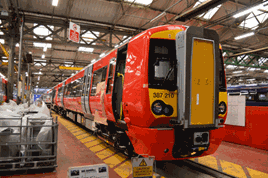“We’re already making massive improvements through franchising - such as removing Pacer trains from the north of England with requirements for at least 120 new-build diesel vehicles, and introducing new trains on the East Coast, Great Western, and Thameslink lines.
“We are also pressing ahead with our plans for electrification, which will enable faster, greener electric trains to run on large parts of the UK’s rail network.”
Before the franchises were announced on December 9 2015 for Northern and TPE, the RDG said: “Several more large train orders are also expected in the coming years - with the new Northern, TransPennine, Merseyrail and East Anglia franchises all expected to procure new trains.”
Two of those four franchises have now been let, with new trains required. The exact details for the new fleets were under wraps as this issue of RAIL went to press, but it is known that in a £400 million programme, TPE winner FirstGroup is to acquire 220 new carriages (the equivalent of 44 five-car trains), and the company tells RAIL that it is ordering a mix of diesel, electric and bi-mode trains capable of 125mph to be introduced from 2017. As of mid-December, the company was in “advanced discussions” with a number of manufacturers. These trains will replace Siemens Class 185s, which date from 2006-2007, although the ‘185s’ will be retained to make up future South TransPennine trains in six-car formations - almost doubling capacity on that route.
Northern’s 281 new vehicles will be made up into 98 new train sets: 43 new electric trains (EMUs - a mixture of three-car and four-car) and 55 new diesel units (DMUs- a mixture of two-car and three-car).
Many of these trains will be capable of 100mph, and they will be the first brand new DMUs built for the UK mainland since the Class 172s in 2012 for London Midland and Chiltern Railways. The last DMUs built for the UK were actually built for Northern Ireland by Spanish train manufacturer CAF, the company responsible for the construction of the Heathrow Express Class 332 and Northern Rail Class 333 fleets, and which is also building the Mk 5s for Caledonian Sleeper.
Northern franchise winner Arriva says the overall fleet changes “are significantly more complex”, but the total number of carriages increases from 794 in April 2016 to 921 by December 2022, a 16% rise with the introduction of the new trains. Crucially for campaigners in the North, these new vehicles mean that the Class 14x trains are being withdrawn by the end of 2019.
TransPennine Express is no stranger to new trains. As well as the Class 185 DMU fleet (51 three-car trains), it is also home to ten four-car Class 350/4s delivered in 2013. Rumours persist that they will be cascaded away from TPE in due course, perhaps to London Midland where they will join Class 350/3s that were delivered at the same time as the TPE fleet. Nothing has been officially confirmed.
So what has been ordered and delivered in recent years?
Southern took delivery of Class 377s from Bombardier in 2013 and 2014, which enabled it to boost capacity on its Metro operations and also on the West London Line. Twenty-six five-car Class 377/6s (130 vehicles) ordered in 2011 were delivered less than 700 days later, entering traffic in September 2013 and enabling Southern to introduce more seats on heavily-loaded trains. These replaced two-car Class 456s that were transferred to SWT, which in turn was able to increase capacity with these smaller and older trains by adding them to four-car and eight-car formations on heavily-used routes.
Southern also introduced eight five-car trains (377701-377708) for its West London Line trains between East Croydon and Milton Keynes. These replaced four-car Class 377/2s, which were subsequently sub-leased to First Capital Connect (and now part of the TSGN franchise that also includes Southern) for Thameslink operation. Moving Electrostars to the Thameslink route enabled four-car Class 319s to be transferred to Northern Rail to operate on newly electrified railways.
















Login to comment
Comments
No comments have been made yet.